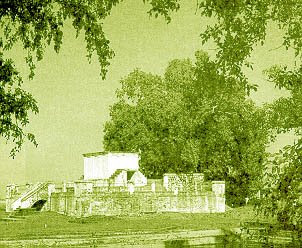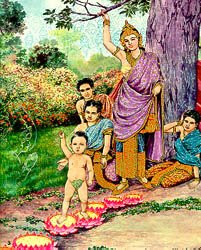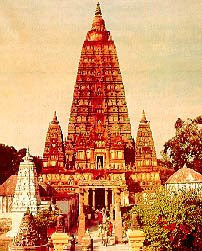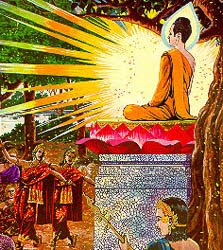วันสำคัญทางพุทธศาสนา วันสำคัญ ภาษาอังกฤษ วันสำคัญเดือนมีนาคม
วันสำคัญทางพุทธศาสนาแบบภาษาอังกฤษ
VISAKHA BUCHA (Vesak) means the worship of the Buddha on the full moon day of the sixth lunar month. It usually falls in May. In the case of a year with an extra eighth lunar month--Adhikamasa (there are 13 full moons in that year)-- the Visakha Bucha Day falls on the full moon day of the seventh lunar month.
BIRTH-ENLIGHTENMENT-PASSING AWAY
The Vesak full moon day (The full moon day of Sixth lunar month)
Visakha Bucha Day is one of the most important days in Buddhism because of three important incidents in the life of The Buddha, i.e. the birth, the enlightenment and the passing away, miraculously fall on the same month and date, the Vesak full moon day. .So each year, Buddhists throughout the world gather together to perform the worship to recollect the wisdom, purity and compassion of the Buddha.
HISTORICAL BACKGROUND
The Buddha was a king by birth. His clan name was Gotama. He was born in Sakya Kingdom, eighty years before the Buddhist Era (around 2625 year ago), at Lumbini Park (now called Rummindel, in Nepal, north of India), in Madhayama Pradesa, located between Kapilavastu, capital of the Sakya Kingdom and Devadaha, capital of the Koliya Kingdom, on Friday, the Vesak full moon day in the year of the dog.
Prince Siddhatha (the Buddha's personal name) was the son of King Suddhodana and Queen Sirimahamaya. On his birthday, Queen Sirimahamaya who was pregnant, wanted to pay a visit to Devadaha wich was her native country.
In the morning of the Vesak Full moon day, the Queen left Kapilavastu on a visit to Devadaha. Approaching a lovely park of Salstrees called Lumbini, located between the two capitals but nearer to Devadaha, the Queen wanted to visit the park and when she arrived at a Sal tree she started contractions and gave birth to a son there. When the Kings of Kapilavastu and Devadaha learned this, they were very happy and arranged a procession back to Kapilavastu.
Prince Siddhatta was brought up in the midst of luxury, led the happy life of a privileged youth and married at the age of 16 to Princess Yasodhara or Bimba who bore him a son, Rahula.
He discontened and took on the life of a wandering ascetic a the bank of the Anoma River. He was then 29.
He studied the mystic practices of the foremost Brahmin ascetics and realized that such practices were not the way to enlightenment. He went on his own way applying the reflective thought of conscious meditation to a rational simple life of moderation.
At the age of 35, he attained Enlightenment at Uruvelasenanigama subdistrict, Magadha State, (nowadays, located in the area of Buddha Kaya, Bihar State, India), on Wednesday, the Vesak Full moon day, the year of the cock, forty five years before the Buddhist Era.
The Dhamma discovered by the Buddha was Ariyasacca or the Four Noble Truths, namely:
The Noble Truth of Suffering
The Noble Truth of the Origin of Suffering
The Noble Truth of the Extinction of Suffering
The Noble Truth of the Path leading to the Extinction of Suffering
After having attained Enlightenment, the Buddha wandered from place to place teaching his discoveries to people who are accessible to instruction, helping large numbers of them achieve various levels of spiritual attainment. He sent his followers to spread Buddhism in capitals, cities and upcountry, until Buddhism was firmly established and widely spread.
The Buddha passed away on Tuesday, the Vesak full moon day in the year of the small snake under the two Sal trees in the Sala Grove of the Mallas in Kusinara, capital of the Malla State, (nowadays located in Kusinagara of Uttrarapradesa, India) at the age of eighty (around 2545 years ago).
The performance of the rituals on Visakha Bucha day had been continuously observed in Jambudavipa or India, the motherland of Buddhism, for a long time before Buddhism spread to Sri Lanka andThailand. There, the Visakha worship has been continually observed to the present day.
In Thailand, Visakha Bucha observance began during the Sukhuthai period (around 700 years ago), because of the close religious relations between Thailand and Sri Lanka. Sri Lankan monks came to propagate Buddhism in Thailand and were highly respected. Thai monks also went to study in Sri Lanka. It's believed that, those monks introduced this ceremony to the King and people at that time.
แหล่งที่มา : panich051.blogspot.com






